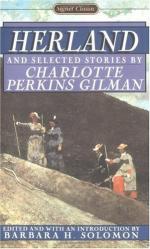|
This section contains 367 words (approx. 1 page at 400 words per page) |

|
The ultimate precedent for Gilman's, as well as sundry other fictions that take the rubric "Utopia," is Thomas More's Utopia (1516). Originally published in Latin, More's speculative creation of an ideal world coined the term "Utopia" which means "no place."
The ideal world his narrator describes is a communist one where both men and women have access to education and all religions enjoy equal acceptance.
A more influential precedent for Gilman personally was Edward Bellamy's Looking Backward: 2000-1887 (1888). Gilman cited Bellamy's work as an influence on both her literary output and her general worldview.
The novel tells the story of a young man from Boston named Julian West who falls into a deep sleep a la Rip Van Winkle. He remains in his stupor from 1887 until 2000 when he wakes up to find society greatly changed. Poverty has disappeared along with capitalism. Instead of struggling to improve their...
|
This section contains 367 words (approx. 1 page at 400 words per page) |

|




